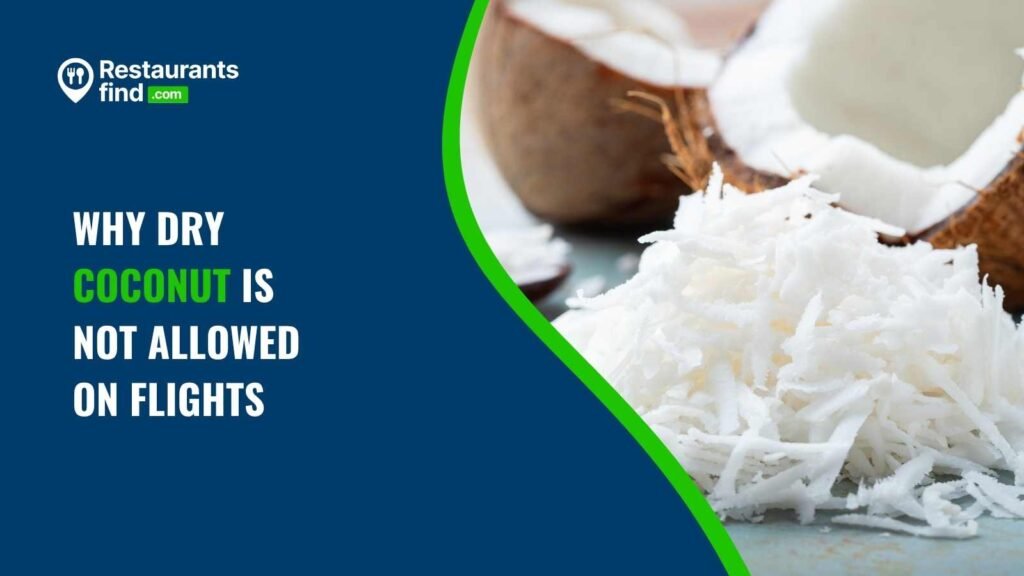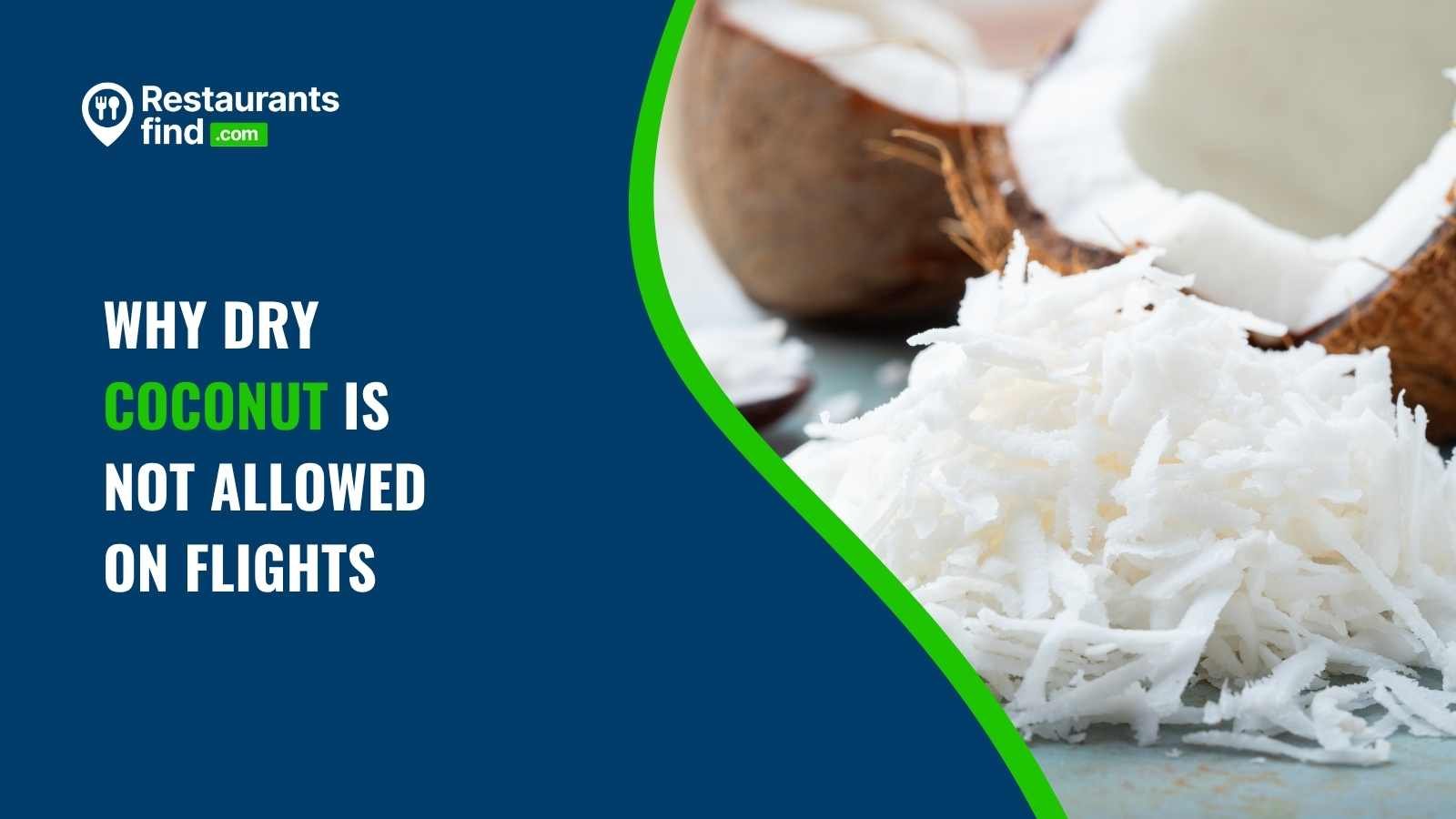Why Dry Coconut is Not Allowed on Flights: Have you ever packed your bags for a trip, only to be surprised at security by a seemingly harmless item being flagged?
Dry coconut is one such unexpected culprit! Understanding what can and can’t be brought on flights is crucial for a smooth travel experience.

Not only does it prevent delays and frustration at the airport, but more importantly, it ensures the safety of everyone onboard.
So, let’s delve into the surprising reason why dry coconut is a no-go on flights. This blog aims to shed light on why dry coconut is not allowed on flights and the underlying safety regulations.
What is Dry Coconut (Copra)?
Copra, also known as dry coconut, is the dried, white flesh of a mature coconut. Why is copra not allowed on flights?
The reason behind its restriction lies in its properties. It is obtained by removing the husk and shell from the coconut, then drying the kernel in the sun or with a kiln.
Uses and Significance: Copra is a valuable commodity, primarily used for extracting coconut oil, a popular cooking ingredient and source of various industrial applications. The leftover residue after oil extraction, called copra meal, serves as a high-protein feed for livestock.
Flammability and Fire Hazard: Despite its seemingly harmless nature, copra poses a significant fire risk. Due to its high oil content, copra can spontaneously combust under certain conditions, particularly in confined spaces with limited ventilation. This flammability is especially concerning in the cargo hold of an airplane, where temperature fluctuations and limited air circulation can create an ideal environment for ignition.
Health and Safety Concerns: While copra itself isn’t inherently toxic, it can trigger allergic reactions in some individuals. Additionally, improperly stored copra can become susceptible to mold growth and infestation by insects or rodents. These factors raise concerns about potential health risks and contamination during air travel.
Therefore, to prioritize passenger safety and prevent fire hazards, airlines strictly prohibit copra in both checked and carry-on luggage.
Also Read: Is Pickles Allowed on International Flights?
Security and Regulatory Framework
International and national regulations play a crucial role in ensuring the safe transport of flammable substances, including copra.
Here’s a breakdown:
- International Framework: The United Nations Model Regulations on the Transport of Dangerous Goods (UN Model Regulations) provide a standardized system for classifying, packaging, labeling, and documenting hazardous materials for air, sea, and land transport. These regulations categorize flammable liquids and solids based on their flash point (the temperature at which they ignite) and other risk factors. Copra, due to its spontaneous combustion potential, would likely fall under this category.
- National Regulations: Individual countries typically have their own regulations that mirror or adapt the UN Model Regulations. These regulations are enforced by national aviation authorities, such as the Federal Aviation Administration (FAA) in the United States or the European Union Aviation Safety Agency (EASA) in Europe. They specify the types and quantities of hazardous materials allowed on passenger flights and outline the necessary documentation and packaging requirements.
- Aviation Security Measures: These measures are implemented by airlines and airport security personnel to enforce national and international regulations. Specific examples regarding copra might include:
- Prohibited Items List: Airlines typically publish a list of prohibited items on their websites and include copra alongside other flammable materials.
- Cargo Screening: Airport security utilizes X-ray scanners and other detection methods to identify potentially hazardous materials in checked baggage.
- Passenger Screening: Security personnel may question passengers about the contents of their carry-on luggage, potentially leading to the confiscation of undeclared copra.
Practical Implications
Inconvenience and Delays: Carrying banned items like copra can significantly disrupt your travel plans. Security personnel are obligated to confiscate such items, leading to delays for inspection and potential repacking of luggage. This can cause you to miss your flight, resulting in rebooking fees and added stress.
Legal Implications: While attempting to carry dry coconut is unlikely to result in serious legal trouble, it can lead to fines or warnings from airport authorities. In worst-case scenarios, it could be considered a violation of aviation security regulations, potentially delaying your travel or even leading to arrest (though this is uncommon).
Alternative Solutions
If you need to transport dry coconut, explore alternative solutions:
- Declare and Ship: Commercial shipping services allow you to send dry coconut as cargo, following proper packaging and labeling regulations based on the quantity.
- Check Regulations: Some countries might allow dry coconut under specific conditions. Research the regulations of your destination country to see if there are exceptions for personal use quantities with proper packaging.
- Alternatives: Consider using readily available coconut products like shredded coconut or coconut oil at your destination instead of transporting dry coconut itself.
Approved Packaging: If allowed by regulations, ensure proper packaging for dry coconut. This typically involves airtight containers to prevent moisture and contamination, with clear labeling indicating the contents.
Conclusion
Understanding why dry coconut is not allowed on flights is essential for ensuring a safe travel experience. The flammability and health risks associated with copra make it a potential hazard in an aircraft environment.
By adhering to safety regulations and opting for alternative transportation methods, passengers can contribute to the overall safety and smooth operation of air travel.
In conclusion, while it might seem inconvenient, these restrictions are in place to protect everyone on board. Always check with your airline for specific guidelines and consider safer alternatives when transporting potentially hazardous items. Safe travels!
